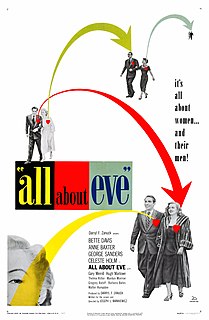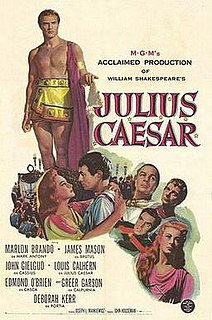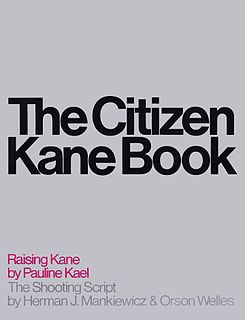
Citizen Kane is a 1941 American drama film by Orson Welles, its producer, co-screenwriter, director and star. The picture was Welles's first feature film. Nominated for Academy Awards in nine categories, it won an Academy Award for Best Writing by Herman J. Mankiewicz and Welles. Considered by many critics, filmmakers, and fans to be the greatest film ever made, Citizen Kane was voted as such in five consecutive British Film Institute Sight & Sound polls of critics, and it topped the American Film Institute's 100 Years ... 100 Movies list in 1998, as well as its 2007 update. Citizen Kane is particularly praised for Gregg Toland's cinematography, Robert Wise's editing, Bernard Herrmann's music, and its narrative structure, all of which have been considered innovative and precedent-setting.

All About Eve is a 1950 American drama film written and directed by Joseph L. Mankiewicz, and produced by Darryl F. Zanuck. It was based on the 1946 short story The Wisdom of Eve by Mary Orr, although screen credit was not given for it.

Woman of the Year is a 1942 American romantic comedy-drama film directed by George Stevens and starring Spencer Tracy and Katharine Hepburn. The film was written by Ring Lardner Jr., Michael Kanin, and John Lee Mahin, and produced by Joseph L. Mankiewicz.

Joseph Ritson was an English antiquary who was well known for his 1795 compilation of the Robin Hood legend. After a visit to France in 1791, he became a staunch supporter of the ideals of the French Revolution. He was also an influential vegetarianism activist.

Joseph Leo Mankiewicz was an American film director, screenwriter, and producer. Mankiewicz had a long Hollywood career, and won consecutive Oscars for both Best Director and Best Writing, Screenplay for A Letter to Three Wives (1949) and All About Eve (1950), the latter of which was nominated for 14 Academy Awards and won six.

Herman Jacob Mankiewicz was an American screenwriter, who, with Orson Welles, wrote the screenplay for Citizen Kane (1941). Earlier, he was the Berlin correspondent for the Chicago Tribune and the drama critic for The New York Times and The New Yorker. Alexander Woollcott said that Herman Mankiewicz was the "funniest man in New York". Both Mankiewicz and Welles received Academy Awards for their screenplay.

Jesus, also referred to as Jesus of Nazareth or Jesus Christ, was a first-century Jewish preacher and religious leader. He is the central figure of Christianity. Most Christians believe he is the incarnation of God the Son and the awaited Messiah prophesied in the Old Testament.

The Barefoot Contessa is a 1954 American Technicolor drama film written and directed by Joseph L. Mankiewicz about the life and loves of fictional Spanish sex symbol Maria Vargas. It stars Humphrey Bogart, Ava Gardner, and Edmond O'Brien.
Joseph Augustine Fitzmyer was an American Catholic priest of the Society of Jesus and professor emeritus at The Catholic University of America, in Washington, DC.

Julius Caesar is a 1953 epic Metro-Goldwyn-Mayer film adaptation of the play by Shakespeare, directed by Joseph L. Mankiewicz, who also wrote the uncredited screenplay, and produced by John Houseman. The original music score is by Miklós Rózsa. The film stars Marlon Brando as Mark Antony, James Mason as Brutus, John Gielgud as Cassius, Louis Calhern as Julius Caesar, Edmond O'Brien as Casca, Greer Garson as Calpurnia, and Deborah Kerr as Portia.
The philosophy of technology is a sub-field of philosophy that studies the nature of technology and its social effects.
Suddenly, Last Summer is a 1959 American Southern Gothic mystery film based on the play of the same name by Tennessee Williams. The film was directed by Joseph L. Mankiewicz and produced by Sam Spiegel from a screenplay by Gore Vidal and Williams with cinematography by Jack Hildyard and production design by Oliver Messel. The musical score was composed by Buxton Orr, using themes by Malcolm Arnold.
Joseph Benjamin Stenbuck was a leading Manhattan surgeon at Sydenham and Harlem Hospital.
The writings of C. S. Lewis.
A list of books and essays about Frank Capra:
The 7th Bodil Awards was held on 27 April 1954 at the World Cinema in Copenhagen, Denmark, honoring the best in Danish and foreign film of 1953.

"Raising Kane" is a 1971 book-length essay by American film critic Pauline Kael, in which she revived controversy over the authorship of the screenplay for the 1941 film Citizen Kane. Kael celebrated screenwriter Herman J. Mankiewicz, first-credited co-author of the screenplay, and denigrated the contributions of Orson Welles, who co-wrote, produced and directed the film, and performed the lead role. The 50,000-word essay was written for The Citizen Kane Book (1971), as an extended introduction to the shooting script by Mankiewicz and Welles. It first appeared in February 1971 in two consecutive issues of The New Yorker magazine. In the ensuing controversy Welles was defended by colleagues, critics, biographers and scholars, but his reputation was damaged by its charges. The essay was later discredited after Welles's contributions to the screenplay were documented and Kael's own scholarship was called into question.

The sources for Citizen Kane, the 1941 American motion picture that marked the feature film debut of Orson Welles, have been the subject of speculation and controversy since the project's inception. With a story spanning 60 years, the quasi-biographical film examines the life and legacy of Charles Foster Kane, played by Welles, a fictional character based in part upon the American newspaper magnate William Randolph Hearst and Chicago tycoons Samuel Insull and Harold McCormick. A rich incorporation of the experiences and knowledge of its authors, the film earned an Academy Award for Best Writing for Herman J. Mankiewicz and Welles.

The authorship of the screenplay for Citizen Kane, the 1941 American motion picture that marked the feature film debut of Orson Welles, has been one of the film's long-standing controversies. With a story spanning 60 years, the quasi-biographical film examines the life and legacy of Charles Foster Kane, played by Welles, a fictional character based in part upon the American newspaper magnate William Randolph Hearst and Chicago tycoons Samuel Insull and Harold McCormick. A rich incorporation of the experiences and knowledge of its authors, the film earned an Academy Award for Best Writing for Herman J. Mankiewicz and Welles.

Vegetable Cookery: With an Introduction, Recommending Abstinence from Animal Food and Intoxicating Liquors is the first vegetarian cookbook, authored anonymously by Martha Brotherton (1783-1861) of Salford. It was first published as A New System of Vegetable Cookery in periodical form in 1812. A second book edition appeared in 1821 and a third was published by Horatio Phillips of London in 1829 under its most well known title Vegetable Cookery.